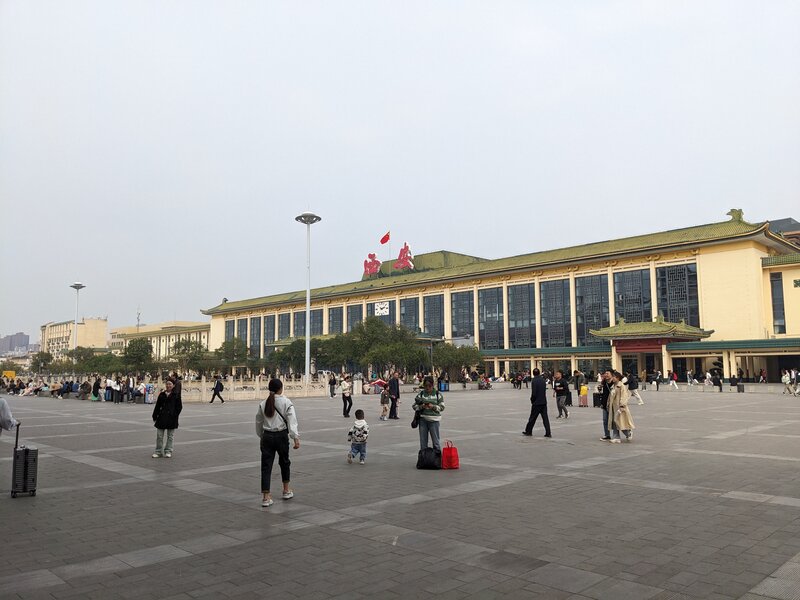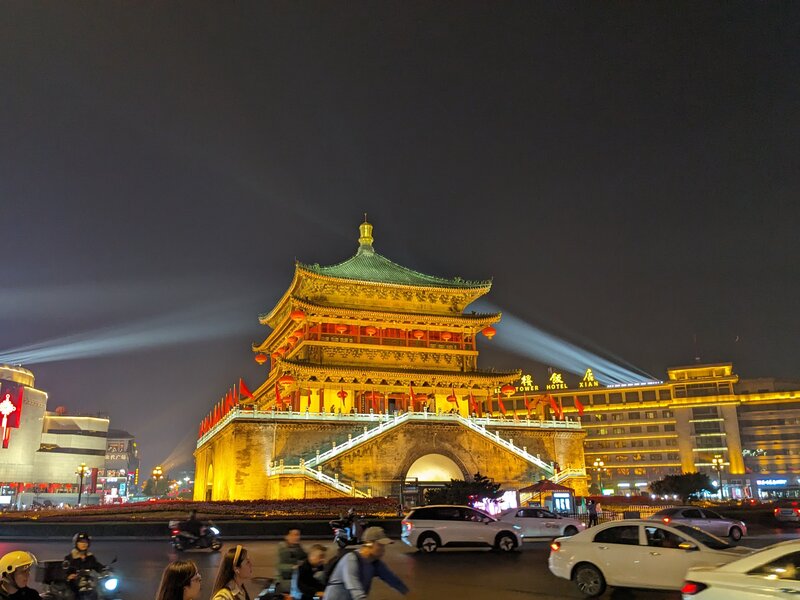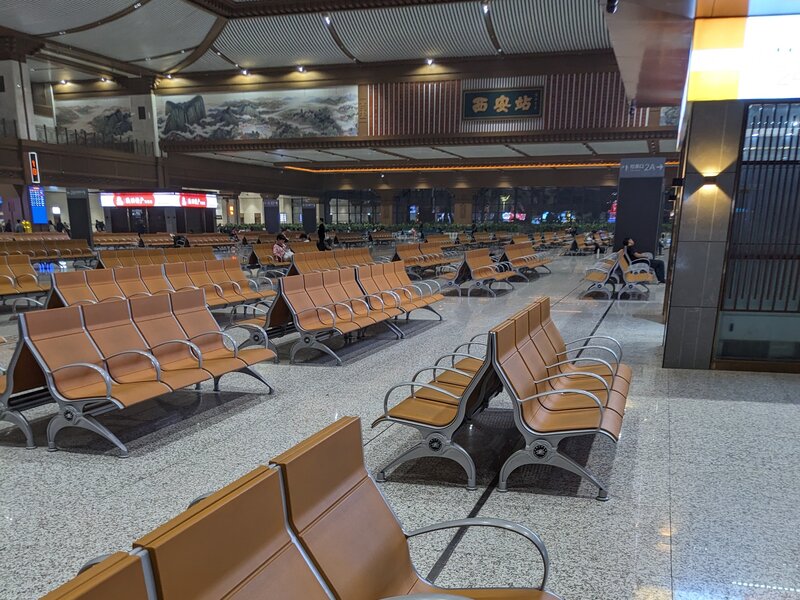Through the night, the train had sped across northern China and was rapidly approaching Xi’an by early morning. The overcast morning sky, stretching over the vast land and distant mountains outside the window, stirred my imagination about what lay ahead. The main thing I wanted to check out in Xi’an was the Terracotta Army. The constant mentions of them in history classes and popular culture had sort of intrigued me, so I figured I’d at least see it while in China. The train rolled into the massive Xi’an station. Since I planned to spend the night at the station later, the first thing I did upon arrival was look for a suitable place to sleep. But everywhere was incredibly busy, and there were just hard concrete floors without any benches. I saw some people lounging on folded cardboard boxes, but I wasn’t sure whether I could pull that off. I decided to worry about the problem later, and leave the station for the time being. There was a whole new city to explore and an entire day ahead.

Xi’an station
After the exhausting experience of dragging my backpack along the Great Wall the day before, I wanted to avoid making the same mistake, so I asked around for luggage storage. Although the station staff didn’t understand a word of English, my clumsy attempt at miming a man putting a bag inside a locker and closing the door got the point across. They laughed and pointed me to the right side of the station entrance. Not knowing whether my performance had truly been convincing, I climbed a long series of escalators and exited the station, following the direction that I had been given. After repeating the same gestures to another staff, I was finally able to reach a place with a sign showing a diagram of a suitcase. I packed everything I needed that day in a smaller bag and dropped off the main backpack with the helpful clerk who also didn’t understand English. We communicated by writing down numbers on a scrap of paper for the duration and the price. After I paid for twenty-four hours, the clerk scanned my backpack in a machine to check for contraband and stored it away.
It was around nine o’clock, and the city was already fully awake and bustling. Even with the busy traffic and noises, somehow Xi’an felt very different from Beijing. The streets here were just far less chaotic compared to the absolute pandemonium that I found in Beijing. I walked around the main streets just outside the Xi’an city wall, soaking in the vibe and checking out local street food. It was comforting. Seeing all the restaurants made me kind of hungry, and I knew what I wanted to go for–I needed to try Jajangmyeon in China. It’s basically a Korean-Chinese dish of dry noodles topped with thick black gravy and ground pork. It is widely popular in South Korea but it originated in China. Having grown up eating that dish countless times, naturally I wanted to know how the Chinese version tasted. As my luck would have it, so many restaurants were serving Jajangmyeon for some reason. I picked a humble establishment near the station and ordered a bowl. Interestingly, Jajangmyeon was a bit different in China. The black gravy sauce was less thick and the texture had more focus on the ground pork. Nibbling at it, I researched how I could get to the Terracotta Army.
The Terracotta Army was actually kind of far away from the city and would take at least a one-hour taxi ride. But as a humble backpacker, I didn’t want to shell out too much money for a taxi. Besides, since I had the entire day in Xi’an, there seemed to be little reason to rush. So I decided to take a subway to the outskirts of town and transfer to a bus that would take me there. Near the train station, there were so many tour operators selling packages, shouting “Bingmayong!” which I guessed was how to say the Terracotta Army in Mandarin. I went up to the desk of one of the operators out of curiosity and greeted her in English. The clerk turned visibly offended and barked at me to speak Mandarin. An English-speaking Korean traveling in China seemed to be too bizarre a concept, a perpetual source of confusion.
After around two hours on the road, I arrived at the Terracotta Army. The army was supposed to have been buried to protect the nearby mausoleum of Qin Shi Huang. The mausoleum was actually built as a city with proper walls, and even walking around its perimeter took me more than an hour. As I traced the ruins of its ancient walls, all I could think about was the boundless ego of mankind and how quickly it becomes irrelevant in the passage of time. When the emperor built the city and an army of warriors to serve him in the afterlife, little did he foresee that the mighty army of his time would become antiquated, and his magnificent city would come to ruin. Maybe the arrogance comes from our inability to place ourselves in the larger timeframe beyond life. While walking around the mausoleum, I crossed paths with another English-speaking traveler who was trying to find the actual mound that marked the tomb of the emperor. He asked me, pointing at a picture, “Do you know where this is? It’s supposed to be at the center.” Since I was actually wondering the same thing, we kind of walked around together with our eyes peeled. Try as we might, we couldn’t find that mound anywhere. It wasn’t until later when I arrived at the northern part of the city wall that I realized where the mound was. Looking at the mausoleum from the elevated ground, I realized the mountain that I had seen in the middle was actually the tomb of the emperor. It was so massive that up close, I hadn’t even recognized it as a tomb but only as a mountain.
When I left the mausoleum, it was around five o’clock and things were already closing down. My legs were still not used to the constant walking and two full days of it had left them pretty tired. So I figured I’d go back to the city center and get some rest. On the bus ride back to the nearby subway station, all the seats were taken, so I stood for about forty minutes. Standing in the middle of the aisle, I saw an interesting sight. At the front of the bus, near the windshield, were flags of the Chinese Communist Party with a hammer and sickle. Even after three days in China, it was still a culture shock for me to see the symbol openly displayed in such a casual way. Even in some former Soviet countries, I didn’t remember seeing any hammer and sickle symbols. Fascinated, I stepped toward the front of the bus and took a picture of the flags, and all the passengers including the driver looked at me like I was a madman. I said to the driver, as if to justify my silly action, “It’s interesting.” I wasn’t sure if he understood why it was interesting to me, or even what I said. But he didn’t seem to care much anyway. It was already dark when a bus and a subway ride eventually took me back to Xi’an station where it had all started.

Xi’an in the evening was pretty charming and full of life. Having recovered from the chaotic state of mind from the beginning of the trip, I was able to appreciate its beauty and interesting details. For example, I began noticing that people’s appearances and culture were slightly changing as I traveled. There were many people that wore religious attire and often had darker complexions than other Chinese people. I figured that they were the local Muslim population. In fact, there was even a mosque nearby. It was built with the traditional Chinese architecture style and was unlike mosques elsewhere in the world, but was still a mosque. This was the first of many times I would observe the changing environment in my westward passage. Another interesting thing I came across on the streets was a Chinese-Russian international store selling Russian stuff. It was loudly playing a catchy, upbeat Russian folk song, and all the signs were in both Mandarin and Russian. I remembered seeing the same store in Beijing the other day as well–it seemed to be a thing here.
As the night deepened, the temperature dropped noticeably and things started closing down. My train to Urumqi wasn’t until 4:50 AM the next morning. Having nowhere to stay, I felt kind of lost in a way that I had never felt before. Everyone around me seemed like they had a place to go, busily talking on the phone and walking around with purpose. It seemed that I was the only one that didn’t know what I was doing. So I went back to the railway station and randomly started walking in one direction from there. The night stroll wasn’t pleasant anymore, as the modest charm of the city had faded behind the cold veil of night, and everything just felt unwelcoming. I retreated back to the station and got to the departure hall. At least, the departure hall wasn’t really busy, probably because the holiday week was almost coming to an end.
I put my backpack down on a bench near the departure board and started passing the time. By midnight, the air around me felt heavy and still. Most people that were sitting around the area had already moved on, and the departure board that was once full showed almost no trains. I got up and changed into a pair of sweatpants to get more comfortable and tried to freshen up by brushing my teeth awkwardly in the decrepit station bathroom. Then I found a quieter area and tried unsuccessfully to sleep for another hour. Spending the cold night on a station bench was tougher than I’d imagined. I hadn’t showered since the morning of leaving Beijing, my stomach hadn’t stopped churning since the first day in China, and I was chafing from walking around in my jeans for far too long. But strangely, I was okay with that and all I could think of was the road ahead.

Slowly, time passed and the seemingly unending night was starting to get interrupted by mild activities and occasional boarding calls. When the boarding finally started for my train to Urumqi, a modest queue of people formed at the gate. After the usual identification check, passengers were allowed on the platform where the train was sitting in the frigid morning air. I tried to find my carriage to escape the cold and get to bed. But there was a problem. My ticket didn’t say anything about the carriage or the seat assignment, and the conductors couldn’t find my name on their record. Since the train was leaving in less than ten minutes, I was running up and down the platform to talk to different conductors that were scattered around different carriages. Some of them would tell me to go to a certain carriage and when I got there, the conductor there wouldn’t be able to find my record, either. This went on for a bit until eventually one of them waved me onto the train and told me to wait in the corridor until they figured out what was going on. Shortly after the train departed, and I realized that I was just being dumb and hadn’t looked at the ticket carefully enough–the ticket did show a carriage and a seat number in smaller print. So I went to my cabin where some people were already sleeping. An attentive conductor helped me make the bed in the lower bunk, and I immediately fell asleep afterwards. I had twenty-six hours until Urumqi and had no idea what I was in for. The prospect of being trapped in motion for that long unsettled me. But after the exhausting two days, the narrow bunk bed felt like a paradise.